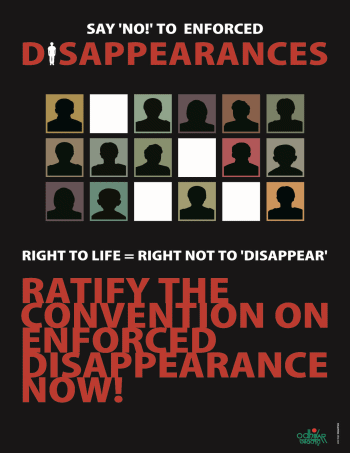April 6, 2016
A Joint Statement by the Asian Human Rights Commission, the Observatory for the Protection of Human Rights Defenders [a joint programme of FIDH and the World Organisation Against Torture (OMCT)], and Odhikar.
The Observatory for the Protection of Human Rights Defenders, the Asian Human Rights Commission, and Odhikar urge the global human rights community to raise its voice and call for justice for the several human rights defenders and journalists who have been shot in the limbs by police forces in Bangladesh.
The latest of such shootings happened on March 31, 2016, when police forces shot eight bullets into the leg of Mr. Md. Afzal Hossain, a Bangladeshi journalist affiliated with Odhikar and Bhola District Correspondent of NTV – a private television channel – and other national and regional newspapers. Afzal was observing the local governmental election at Rajapur Government Primary School, which was turned to a polling centre for the election of the Rajapur Union Council.
Afzal Hossain told the Asian Human Rights Commission that he filmed the scene of ballot stuffing with his camera that morning, when he found that the candidates of the ruling party were rigging votes inside the polling booths. While Afzal was compiling the information for his next reports for the media, the cadres of the ruling party and other opposition parties became violent, beating one another’s supporters and hurling crude bombs at each other. At around 11:40 a.m., while Afzal and his journalist colleagues were waiting near the police on duty at the polling centre, the Police Superintendent of Bhola district, Mr. Mohammad Moniruzzaman Monir, called Afzal over to check his physical location. At about 12:00 p.m., after paramilitary forces had intervened at the scene and there was no more active violence, a Police Constable named Zulhash suddenly pointed his loaded shotgun at Afzal’s left leg and shot him. Some journalist colleagues immediately took Afzal to the Bhola General Hospital.
The doctors of Bhola District’s General Hospital removed the bullets from Afzal’s leg, but were not able to confirm whether his leg could be saved from amputation. Amputations have taken place in many other cases of police shooting the limbs of detainees in Bangladesh.
On April 2, due to the lack of necessary medical equipment and lack of availability of skilled physicians at Bhola General Hospital, Afzal was referred to Sher-E-Bangla Medical College Hospital in Barisal. There, the doctors found that the personnel of Bhola Hospital had distorted the information about the shooting in Afzal’s medical record, having written that ‘rubber bullets’ were used instead of the live ammunition which was actually used. This distortion in the medical record allegedly occurred under pressure from the Superintendent of Police of Bhola.
Since the Sher-E-Bangla Medical College Hospital does not have the facilities to properly determine whether an amputation was necessary, on April 3 doctors referred Afzal to the National Institute of Traumatology and Orthopaedic Rehabilitation (NITOR) in Dhaka, where Afzal arrived in the morning of April 4. The doctors at NITOR dressed Afzal’s leg but refused to admit him, allegedly due to overcrowding and lack of capacity to accommodate him in the hospital. Finally, Afzal was admitted to a private clinic for treatment of his leg.
Our organisations fear that the police specifically targeted Afzal and deliberately shot him in retaliation for his continued fight against human rights violations perpetrated by the police and for exposing electoral irregularities. We express our utmost concern for the physical and psychological safety of Afzal and his family, and we call upon the Bangladeshi authorities to put an end to all acts of harassment towards human rights defenders and journalists in the country.
In addition, the fact that NITOR, the largest public traumatology hospital Bangladesh, refused to treat Afzal, and the lack of public response by the journalist community regarding the shooting, both suggest that the Bangladeshi authorities are putting pressure on several groups to ignore this case, as well as the generalised and widespread human rights abuses happening across the country.
Over the last few years, there have been several cases of the police and the Rapid Action Battalion (RAB) of Bangladesh shooting detainees and demonstrators in the limbs, all with total impunity. The 2015 Annual Report of Odhikar reported 33 cases of people shot in their legs by law enforcement agencies . The victims of this patterned crime of the law-enforcement agencies have been denied justice. The authoritarian government, which mostly relies on the lethal force of the law-enforcement agencies, guarantees impunity to the perpetrators as a default practice in the country. The victims of this violence by law-enforcement agents have been denied justice, as the government has failed to investigate and prosecute the perpetrators of what appears to be a pattern of shootings of defenseless victims.
The international human rights community cannot remain silent in the face of the multiple human rights violations taking place in Bangladesh, particularly those at the hands of law enforcement agents. Our organisations strongly urge civil society and inter-governmental organisations to raise their voice and to call for justice and accountability for human rights violations in Bangladesh, in particular the targeted violence against human rights defenders and journalists.
# # #
The Asian Human Rights Commission (AHRC) works towards the radical rethinking and fundamental redesigning of justice institutions in order to protect and promote human rights in Asia. Established in 1984, the Hong Kong based organisation is a Laureate of the Right Livelihood Award, 2014.
The Observatory for the Protection of Human Rights Defenders (OBS) was created in 1997 by FIDH and OMCT. The objective of this programme is to intervene to prevent or remedy to situations of repression against human rights defenders.
Odhikar is a Bangladeshi non-governmental organization that documents and records human rights violations through fact-finding missions and information received by its network of local human rights defenders. Odhikar also monitors media reports in twelve national daily newspapers.
See Odhikar, Statistics: January-December 2015.
Report Published on April 06, 2016 at www.humanrights.asia www.omct.org www.fidh.org





